Premium
Ary Graca: I want to teach Kenya how to catch volleyball fish
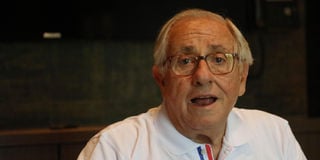
International volleyball Federation (FIVB) President Dr Ary Graca from Brazil during the interview with Nation Sport at Van der Valk Hotel in Apeldoorn, Netherlands on September 30, 2022.
What you need to know:
- His overtures to African volleyball have been eased by the election of Bouchra Hajij as Confederation of African Volleyball (CAVB) President in 2020
- Graca explains that to achieve meaningful success, a project has to have an achieving national team as its foundation
- Graca, who agrees with Kioni that government support will breathe life into this project, says Kenya winning a match in Paris 2024 will give him the best retirement package
Risk, reward and the patience in between is what defines the over six decades of Dr Ary Graca’s life in volleyball.
To say that he has mastered this concept is an understatement because the Graca of today is actually a reward of the risks he took years ago.
Growing up in Rio de Janeiro, Brazil, Graca – even in his wildest dreams - never imagined he would one day head the International Volleyball Federation (FIVB).
Yet it’s what he has been doing for the last 10 years and the results are there to see. Just like he transformed the Brazilian Volleyball Confederation (CBV) and Confederation of South American Volleyball (CSV), the indefatigable Graca has carried his Midas touch to FIVB.
The effect has been felt in the financial coffers and the immense growth in popularity of the sport, the world over.
Despite all his success in his 45-year career as a sports administrator, he is still hungry for more. As he enters the last two years of his 12-year tenure at FIVB, the 79-year-old Graca is on a personal mission to transform African volleyball.
“I don’t normally give interviews but I agreed to do this one because you’re from Africa,” reveals Graca, his right hand tapping on the left side of his chest. “I don't want to die before I develop Africa.”
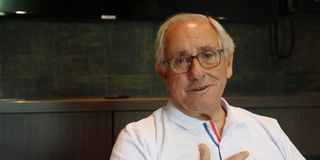
International volleyball Federation (FIVB) President Dr Ary Graca from Brazil during the interview with Nation Sport at Van der Valk Hotel in Apeldoorn, Netherlands on September 30, 2022.
This interview, which was initially meant to last 30 minutes due to his tight schedule here in Netherlands, took an age to secure. However, on the material day it stretched to over an hour. The passion for his dream, the assurance in his voice, the clarity in his memory and the allure of a better tomorrow for Africa; all responsible for the extended period.
Direct investment
“When I got elected (as FIVB President) in 2012, people from Oceania approached me and told me ‘We feel abandoned, please change that’. This statement really impacted me because I thought of Africa, Asia and many countries from the former Soviet Union. I had this experience before with Ecuador, Bolivia, Guyana when I was president of CSV so I wanted to do something to make them all feel included,” begins Graca before revealing how his love story with Africa began.
“The system FIVB had before was that all the money was distributed by the continental confederations so I had to first submit myself to it in my first term (2012-2016). But it was a total failure especially in Africa. After 20 million dollars we sent to the African confederation, nothing happened. That’s why we decided to do it directly, not through confederations anymore,” lamented Graca.
“In North America and Brazil, we have many Afro-Americans and Afro-Brazilians playing all kinds of sports very well. I was thinking why not go directly to the base, to the fathers that are the Africans themselves,” remarked a beaming Graca.
Teach how to fish
To actualize his dream, Graca had to get the FIVB Technical, Coaches and Athletes Commissions on board to support the Volleyball Empowerment project which seeks to reinvest profits from volleyball back to the sport. But Graca doesn’t want to give it all on a silver platter.
“I don’t want to give fish but to teach how to fish. I know what it means to be poor because I played barefoot for the Brazil national team in the 60s. I made a commitment to myself that I won’t let that happen to good players again in my life. I’m not thinking about today because I will be leaving in two years but I’m going to create a basis for the development of the game in Africa.
“There are many excellent players in Africa but they don’t get the opportunity to reach their potential due to many challenges. It’s our obligation to give them this opportunity. You cannot use the USA way to solve African problems but maybe the Brazilian way can work because the conditions are quite similar. I have done it before with Brazil and I know it’s possible because I’m speaking from a point of experience not just theory,” recalled Graca of his 15-year tenure as CBV president when Bernardo Rezende’s men’s dream team won virtually every title available.

International volleyball Federation (FIVB) President Dr Ary Graca from Brazil during the interview with Nation Sport at Van der Valk Hotel in Apeldoorn, Netherlands on September 30, 2022.
His overtures to African volleyball have been eased by the election of Bouchra Hajij as Confederation of African Volleyball (CAVB) President in 2020.
"The Empowerment Programme through the targeted support will see the top African volleyball and beach volleyball nations have a chance to improve their performance at world stage as they are given access to world class coaches and facilities.
"It is my hope the the scope of the Empowerment system be extended to address elements like infrastructure development and participation of our teams in competitions especially in the youth and junior categories," Bouchra told Nation Sport.
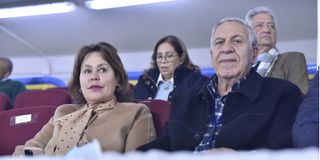
Confederation of African Volleyball (CAVB) President Hajij Bouchra (left) follows proceedings at the Africa Under-21 Nations Championship in Cairo, Egypt on February 22,2020.
Malkia Strikers project
The Volleyball Empowerment Commission launched its first project in Africa with Kenya women’s national team, Malkia Strikers. Graca explains that to achieve meaningful success, a project has to have an achieving national team as its foundation.
“The most important thing is to have a good national team because if you have a good national team, you have a product to sell. You cannot go to your President in Kenya for instance, to sell an idea of developing the sport without a competitive national team. You have to create idols through the national team and every boy or girl will want to become like them,” said Graca, mentioning Brazilian legend Giba as the face of his project in Brazil.
“To have a strong team, you must have a good coach. We are sending coaches to Kenya not just to train the team but also to transfer knowledge of how a national team should be run. A team has to have a structure of assistant coach, physical trainer, physiotherapist, psychologist, statistician. With this professional structure, in two or three years you will have a result then you can go with that result to sponsors, government and ask for funding.”
“I remember in 1977, we didn’t have money for anything. I was a director of a bank in Brazil, I put money in us hosting a junior World Championship where we finished third. After that the government reimbursed us all our expenses and this team became Olympic champion in 1984. The government decided to support us because we had something to offer, not just asking for money,” recalled Graca, who was the CBV Vice President at the time.

International volleyball Federation (FIVB) President Dr Ary Graca from Brazil during the interview with Nation Sport at Van der Valk Hotel in Apeldoorn, Netherlands on September 30, 2022.
He reckons that off the courts, African federations must embrace good governance to attract partners to support their development agenda.
“A president of a national federation is not obliged to understand finance, administration, volleyball development, marketing etc. We must have professionals working on that. The President is the head but he has to have people with the required knowledge handling these functions,” he emphasized citing the current FIVB structure as an example.
“We want them to see volleyball as a business. It’s good that people are starting to realise it’s not enough to have the national team playing regularly in our competitions. In these times, we need to see media, marketing, sales, innovation supporting the main product. Once we have this in place for the national team then we go to the next step of developing the national leagues. We must help the federations understand how to run professionally.”
No quick fixes
The Kenyan project, which began just before the Tokyo Olympic Games in March last year, will receive its first real test at the ongoing World Championship in Netherlands where Malkia Strikers are seeking to qualify for the second round for the first time in seven appearances. Graca is impressed by the work put in by the Brazilian coaches led by Luizomar de Moura who has previously won two world junior titles with the Brazil Under-18 team.
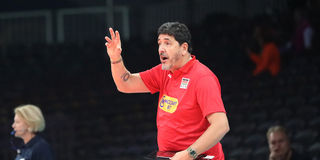
Kenya coach Luizomar de Moura reacts on the touchline during their FIVB World Championships Pool A match against Belgium at Gelredome arena in Arnhem, Netherlands on September 25, 2022.
“We don’t want to have quick success because you cannot go from zero to 100 in one attempt. You have to climb the stairs which is what you are doing now. Whether they beat Puerto Rico or not, for us it’s already mission accomplished because they beat Cameroon and are playing very well,” underlined Graca ahead of Kenya’s do or die clash with Puerto Rico yesterday where the winner will get a ticket to the second round.
“I am satisfied with the performance against Italy because they showed good confidence. To win is important but how to win or how to lose is also important. Against Italy, you lost the second set 25-23, but it was fantastic! It was very good and showed progress. The girls are strong physically so it’s just a matter of teaching them techniques and helping them to understand tactics.”
Paris 2024 Olympics
Kenya Volleyball Federation (KVF) President Waithaka Kioni has expressed gratitude to FIVB for choosing Malkia strikers for their pilot project in Africa noting that government has to play its role for the project to be a success.
“We appreciate FIVB and NOC-K for the support they have given us since this project started. The performance of the team has really improved and we hope they will do incredibly well in the 2024 Olympic Games,” said Kioni.
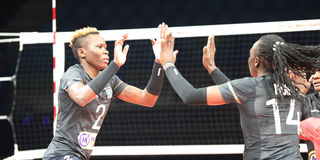
Kenya outside hitters Veronica Adhiambo (left) and Mercy Moim celebrate a point during their FIVB World Championships Pool A match against Cameroon at Gelredome arena in Arnhem, Netherlands on September 27, 2022.
Graca, who agrees with Kioni that government support will breathe life into this project, says Kenya winning a match in Paris 2024 will give him the best retirement package.
“We are going to continue the program. If the government helps a little bit more in five years you are going to be in the podium (of a global competition). It’s important that the Kenyan project is a success because everybody is going to believe with our help, they can make it.
“I will go home with a very good example to the whole of Africa. My legacy will be the development of volleyball. Then I can die peacefully knowing I did everything I could for athletes who didn’t have a chance,” asserted Graca, who will be 81 in 2024.
Another risk, another reward…Perhaps Kenyans have to be patient in between and trust the process!





